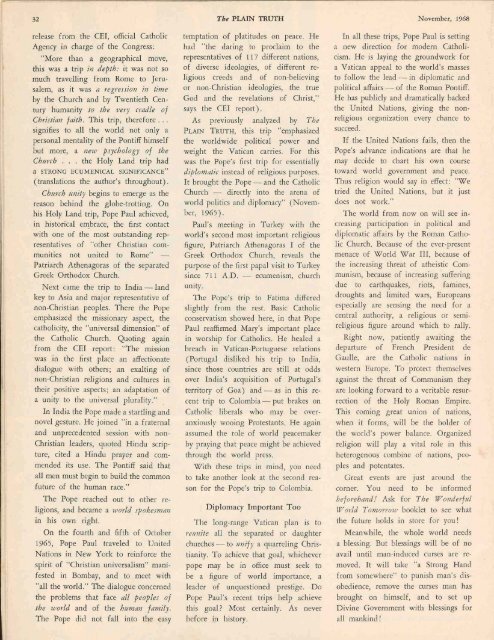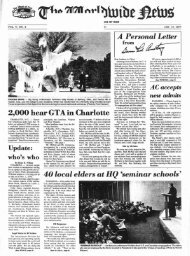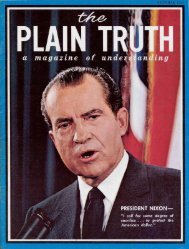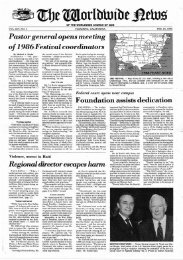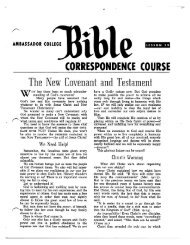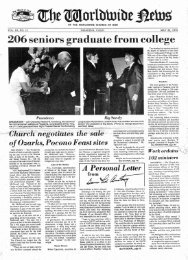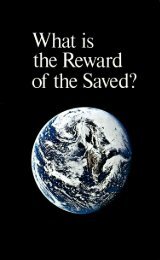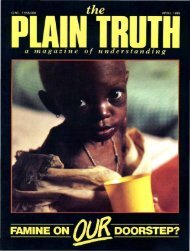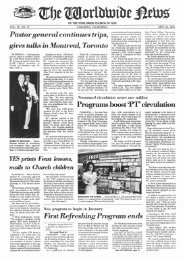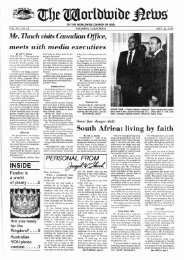The Generation Gap-WHY? - Herbert W. Armstrong
The Generation Gap-WHY? - Herbert W. Armstrong
The Generation Gap-WHY? - Herbert W. Armstrong
You also want an ePaper? Increase the reach of your titles
YUMPU automatically turns print PDFs into web optimized ePapers that Google loves.
32<br />
release from the CEI, official Catholic<br />
Agency in charge of the Congress:<br />
"More than a geographical move,<br />
this was a trip in depth: it was not so<br />
much travelling from Rome to Jeru <br />
salem, as it was a regression in time<br />
by the Church and by Twentieth Century<br />
humanity to the ~'ery cradle of<br />
Christian faith . Thi s trip, therefore . . .<br />
signifies to an the world not only a<br />
personal mentality of the Ponti ff himself<br />
but more, a JleUI psychology of the<br />
Church ... the Holy Land trip had<br />
a STRONG ECUMENICAL SIGN IFICAN CE"<br />
(translations the author's th rough out) .<br />
Cbnrcb Im i t)' begins to emerge as the<br />
reason behind the globe-trotting. On<br />
his H oly Land trip, Pope Paul achieved,<br />
in historical embrace, the first contact<br />
wit h one of the most outstanding re p ~<br />
resentat ives of "other Christia n communities<br />
not uni ted to Rome" <br />
Patriarch Athenagoras of the separated<br />
Greek Orthodox Church.<br />
Next came the trip to India - land<br />
key to Asia and majo r representat ive of<br />
non-Chr istian peop les. <strong>The</strong>re the Pope<br />
emphasized the missionary aspect, the<br />
catholicity, the "universal dimension" of<br />
the Catholic Church. Quo ting again<br />
from the CEI report : "T he mission<br />
was in the first place an affectionate<br />
dialogue with others; an exalting of<br />
non-C hristian religions and cultures in<br />
their positive aspects; an adaptation of<br />
a unity to the universal plurality."<br />
In India the Pope made a startling and<br />
novel gesture. He joined " in a fraternal<br />
and unprecedented session with non<br />
Christian leaders, quoted Hindu scripture,<br />
cited a H ind u prayer and cornmended<br />
its use. <strong>The</strong> Pontiff said that<br />
all men must begin to build the common<br />
future of the human race."<br />
<strong>The</strong> Pope reached out to other teligions,<br />
and became a world spoees man<br />
in his own right.<br />
On the fourth and fifth of October<br />
1965, Pope Paul traveled to United<br />
Nations in New York to reinforce the<br />
spirit of "Chr istian universalism" manifested<br />
in Bombay, and to meet with<br />
"all the world." <strong>The</strong> dialogue concerned<br />
the problems that face all peoples of<br />
the world and of the btonan family.<br />
<strong>The</strong> Pope did not fall into the easy<br />
Th e PLAIN TRUTH<br />
temptation of platit udes on peace. He<br />
had "the daring to proclaim to the<br />
representatives of 117 different nations ,<br />
of diverse ideologies, of differ ent teligious<br />
creeds and of non -believing<br />
or non-Christ ian ideologies, the true<br />
God and the revelations of Christ,"<br />
says the CEl report) .<br />
As previously analyzed by <strong>The</strong><br />
PLAIN TRUTH, this trip "emphasized<br />
the worldwide political power and<br />
weig ht the Vatican carries. For this<br />
was the Pope's first trip for essentially<br />
diplomatic instead of religious purpos es.<br />
It brought the Pope - and the Catholic<br />
Church - directly into the arena of<br />
world politics and dip lomacy" (November,<br />
(96 5) .<br />
Paul's meeting in Turkey with the<br />
world's second most important religious<br />
figure, Patriarch Athenagor as I of the<br />
Greek O rthodox Church, reveals the<br />
purpose of the first papal visit to T urkey<br />
since 7 11 A.D. ecumeni sm, church<br />
unity.<br />
TIle Pope's trip to Fatima d iffered<br />
slightly from the rest. Basic Catholi c<br />
conservatism showed here, in that Pope<br />
Paul reaffirmed Mary 's important place<br />
in worship for Catholics. He healed a<br />
breach in Vatican-Portugu ese relations<br />
( Portugal disliked his trip to India,<br />
since those countries are still at odds<br />
over Indi a's acquisition of Portugal's<br />
territory of Goa) and - as in th is recent<br />
trip to Colombia - put brakes on<br />
Catholic liberals who may be overanxiously<br />
wooing Protestants. He again<br />
assumed the role of world peacemaker<br />
by praying that peace mig ht be achieved<br />
through the world press.<br />
W ith these trips in mind , you need<br />
to take another look at the second reason<br />
for the Pope's trip to Colomb ia.<br />
Di pl omacy Important T oo<br />
T he long-range Vatican plan is to<br />
reunite all the separated or daughter<br />
churches - to N1z;fy a guarreling Christianity.<br />
To achieve that goal, whichever<br />
pope may be in office must seek to<br />
be a figure of world importance, a<br />
leader of unq uestioned prestige. Do<br />
Pope Paul's recent trips help achieve<br />
this goal ? Most certainly. As never<br />
before in history.<br />
November, 1968<br />
In all these trips, Pope Paul is setting<br />
a new direction for modern Catholicism.<br />
He is laying the groundwork for<br />
a Vatican appeal to the world 's masses<br />
to follow the lead - in diplomatic and<br />
political affairs - of the Roman Pontiff.<br />
He has publicly and dram atically backed<br />
the Un ited Nations, giving the nonreligiou<br />
s organization every chance to<br />
succeed.<br />
If the United Nations fails, then the<br />
Pope's advance indi cations are that he<br />
may decide to chart his own course<br />
toward world government and peace.<br />
Th us religion would say in effect: "We<br />
tried the Un ited Nations, but it just<br />
does not work ."<br />
Th e world from now on will see 10<br />
creasing participation in political and<br />
diplomatic affairs by the Roman Catholic<br />
Church. Because of the ever-present<br />
menace of W orld W ar III , because of<br />
the increasing threat of atheistic Commun<br />
ism, because of increasing suffering<br />
due to earthquakes, riots, famines,<br />
droughts and limited wars, Europeans<br />
especially are sensing the need for a<br />
central authority, a religious or semireligious<br />
figur e around which to rally.<br />
Right now, patiently awaiting the<br />
departure of French President de<br />
Gaulle, are the Catholic nations in<br />
western Europe. To protect themselves<br />
against the threat of Communism they<br />
are looking forward to a veritable resurrection<br />
of the Holy Roman Empire.<br />
Th is coming great un ion of nations,<br />
when it forms, will be the holder of<br />
the world 's power balance. Organized<br />
religion will play a vital role in this<br />
heterogenous combine of nations, peoples<br />
and potentates.<br />
G reat events are just around the<br />
corner. You need to be informed<br />
beforehand! Ask for <strong>The</strong> W ond, rflil<br />
If/orld Tomorrow booklet to see what<br />
the future holds in store for you !<br />
Meanwh ile, the whole world needs<br />
a blessing. But blessings will be of no<br />
avail unti l man-induced curses are removed<br />
. It will take "a Strong Hand<br />
from somewhere" to punish man's disobedien<br />
ce, remove the curses man has<br />
brought on himself , and to set up<br />
Divine Government with blessings for<br />
all mankind!


